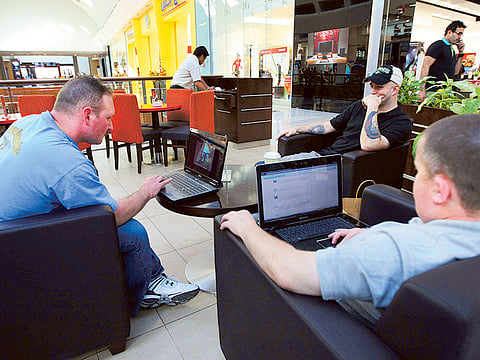Cultivating start-ups through flexible workspaces
Independent and flexible workspace market boosts start-up culture in Dubai

DUBAI: Walk into any coffee shop in the city and you will find people working on their own side projects, from designing products to programming games to writing copy.
The growing popularity of alternative workspaces due to technological advances and a culture where people are increasingly choosing flexibility over the stability of the 9-to-5 job have resulted in the rise of the notion of co-workspace market.
These co-workspaces are membership based platforms where diverse professionals work together in a shared, communal setting. While many businesses have started recognising these as alternatives to traditional offices, a significant part of this market’s users are freelancers and aspiring entrepreneurs.
“These platforms are not just office spaces, but a community to people who want to start their own businesses or become independent contractors, or simply transition their careers in a way that helps create a more independent lifestyle,” said Dianne Mulcahy, author of The Gig Economy and adjunct lecturer in the entrepreneurship division at Babson College in Massachusetts, US.
“It lets them work together, to grow their ideas and then use the gained knowledge and experience to get their trade up and running much faster than normally would be possible,” she adds.
According to the Global Co-working Survey 2015-2016 by DeskMag, an online co-working magazine, there were approximately 8,700 co-workspaces worldwide by the end of 2015 and the number was expected to go over 10,000 by the end of 2016.
The survey also estimated that over 60 per cent of co-workspaces planned some form of expansion and 80 per cent expected an increase in the number of members by the end of the year. Results for the 2016-2017 survey are yet to be released.
“The regional co-workspace market is still taking off in contrast to the global one — which has matured quite significantly in the past few years — but it is safe to expect an increase locally as people recognise their benefits,” says Shubhang Bhattacharya, marketing & communications manager at Impact Hub Dubai, a co-working space and community.
Most co-workspaces in the UAE, for instance, also assist with the legal and financial guidance needed to kick off start-ups and are coupled with a business centre or an incubator.
“Once we feel that a start-up is ready to get funded or receive a sufficient financial support, we then connect them to the concerned organisation and individuals,” he said.
CrowdFunDxb, a crowdfunded pitch competition that gives financial and business support to aspiring entrepreneurs, is one such initiative.
Bhattacharya added that the legal factors can be quite a challenge, especially for starts-up with a novel business idea. “We educate them on the basics. However, the more intricate stuff, we leave to the experts. We have tie ups with partners who set-up businesses and consult these aspiring entrepreneurs on how to get started.”
Another advantage these co-workspaces bring to aspiring entrepreneurs is how much easier it makes it for them to network and work in a community of like-minded individuals.
“As first-time entrepreneurs, it is essential that you work in an environment that stimulates innovation and creativity,” says Ayush Chordia, co-founder of Wrappup, a meeting productivity app, prototyped at Impact Hub Dubai and currently under In5 Innovation Centre, the start-up incubator launched by TECOM in Dubai. “The initial feedback that we got from the Hub community really helped us to prototype fast on the product.”
“Another benefit is the wide variety of skills that you have access to when everyone is working in a joined space — a chat at the water cooler could result in finding the graphic designer you have been looking for,” said Nezar Kadhem, co-founder of Eat, a restaurant discovery and real-time reservations platform, currently based at Impact Hub. Eat has recently raised $2 million in funding.
That is not to say that co-working doesn’t come with its own share of challenges.
“Working in proximity with others can mean on occasion that the noise level can affect your concentration. A lack of privacy can also be an issue if you find yourself in the same space a direct competitor,” said Kadhem.
To the naysayers, such work ecosystems may foretell a dystopian future of disenfranchised and muddled workers hunting for their next big idea and a platform that would support them in executing it. But to the optimists, it promises a future of empowered entrepreneurs.
“The benefits far outweigh the negatives,” said Kadhem.
Overall, for entrepreneurs such as Chordia and Kadhem, Dubai’s budding co-workspace market offers more than a physical desk space — it is a holistic experience that offers legal, financial and social infrastructures curated to assist them bring their ideas to life.
The writer is an intern with Gulf News.



